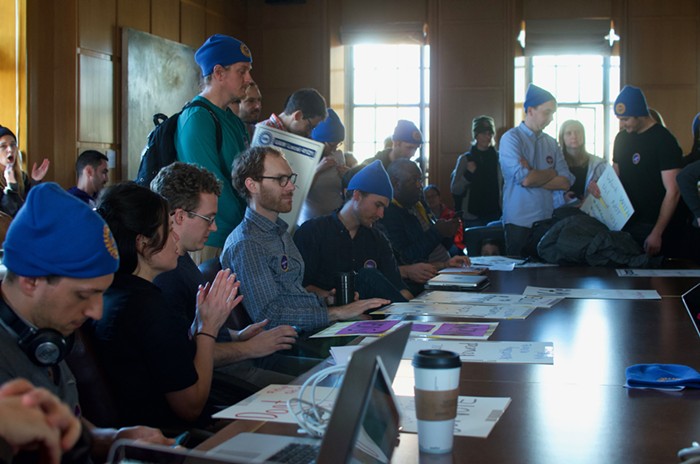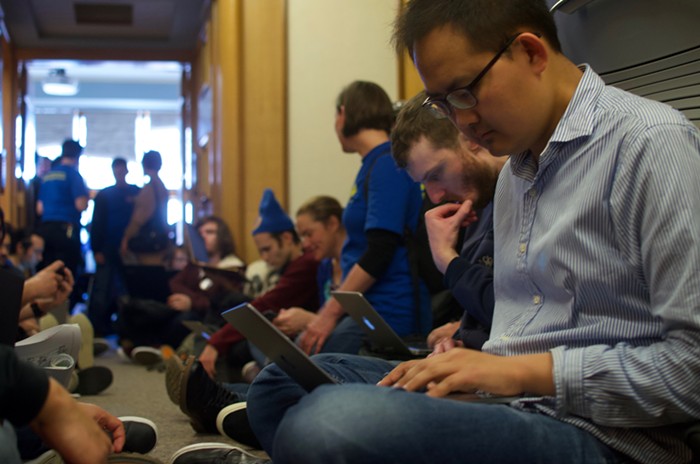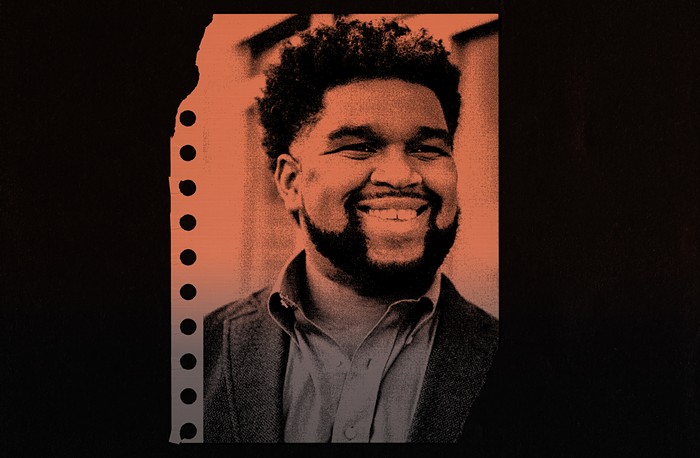
Wednesday afternoon an estimated 200 University of Washington postdoctoral researchers held a work-in protest at President Ana Mari Cauce's office. The group, Postdocs United, crowded into a conference room and lined the hallways with laptops in hand, all prepared to work on research papers or lab reports until the administration respected a Washington State Public Employment Relations Commission (PERC) decision allowing the postdocs to form a union for the first time in the history of the state.
PERC's ruling was handed down on March 1 after months of disputes between Postdocs United and the university. The postdocs say the university has been unnecessarily delaying their efforts to unionize, which reflects UW's long history of fighting similar efforts on the part of grad students, medical residents, and professors. The university maintains that it's just following the rules.

Victor Balta, senior director of communications for UW, said the administration informed members of Postdocs United at the demonstration on Wednesday that President Cauce will make a decision today about whether to appeal PERC's ruling or accept it and set a date for a vote. The university has a March 21 deadline to signal their intent.
After pushing Cauce to say she'd make a decision, and after several back-and-forth discussions with other officials, UW Postdoc Brian Weitzner said organizers left the offices shortly before 5 p.m., chanting "We'll be back! We'll be back!"
Weitzner said they're going back to the offices today at 1:30 p.m. to "strongly encourage [Cauce] to make the right choice."
"A choice to delay at this point in time is seen as an intentional delay by us. If they delay, we'll encourage them to withdraw that delay," Weitzner said.
Way back in October of 2017, a majority of UW's 1,100 postdocs signed cards in support of forming a union. They hand-delivered those cards to the president, and her office said they'd review the action. Since then, organizers say, the administration has been "inappropriately and unnecessarily" slow-rolling the process. University officials disagree.
Weitzner says the university has been exploiting confusingly named job titles to muddy the waters. There are four main titles for postdocs: research associates, research associate trainees, senior fellows, and senior fellow trainees. The university also labels some postdocs as acting instructors, acting assistant professors, and lecturers. Different departments use one title or the other, though the positions are essentially the same. Trainees, however, are funded from a different source, and their benefit packages and grievance procedures are different.
In October, Postdocs United filed with PERC to form a new bargaining unit. They provided a list of titles that should be included in the unit. UW then gave PERC a list of employees matching those titles, but Weitzner claims that list included "duplicate names, and people who weren't even postdocs." Following Postdoc United's objection and clarification, UW produced another list. Based on that new list, PERC determined there was indeed a majority of postdocs interested in forming a union.
But then in November, UW claimed that 35 percent of the postdocs should be excluded from the bargaining unit because "research associates" were listed as faculty in the university's Faculty Code. Postdocs United disagreed, citing a state law that specifically differentiates postdocs from faculty. PERC sided with the postdocs in the March 1 ruling.
On March 6, Postdocs United hand-delivered a letter to President Cauce, asking her to act on the ruling soon. Weitzner said Cauce told the group that her administration hadn't yet read the decision and wouldn't be giving the group a timeline.
As a result of the work-in yesterday, Postdocs United has now been given a timeline.
Weitzner said his position at UW used to serve as a one-year or two-year contract gig for researchers who recently completed their PhDs, but it's since ballooned into a 5-and-a-half-year (and sometimes more) position. The university has been increasingly relying on postdocs—who bring in tons of grant money and prestige but who cost way less than a full-time professor—but the job is just as insecure as it ever was.
Postdocs can be fired with only 60 days notice and for any reason. This situation is especially cruel for international researchers working on a visa. An Iranian postdoc at UW claims she was fired shortly after Trump's first travel ban because her "supervisor was concerned about having an Iranian citizen working on the research project after the issuance of the Executive Order.”
If/when UW recognizes the union, Postdocs United plans to negotiate for parental leave, child care, more secure visa practices, and better compensation. They also plan to "fight harassment and unfair firings."














